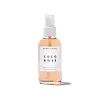What's inside
What's inside
 Key Ingredients
Key Ingredients

 Benefits
Benefits

 Concerns
Concerns

 Ingredients Side-by-side
Ingredients Side-by-side

Helianthus Annuus Seed Oil
EmollientUndaria Pinnatifida Powder
AbsorbentCitrus Paradisi Peel Oil
MaskingTocopherol
AntioxidantLupinus Albus Seed Extract
Skin ConditioningPassiflora Edulis Seed Oil
EmollientOryza Sativa Bran Oil
EmollientEuterpe Oleracea Fruit Oil
Skin ConditioningOrbignya Oleifera Seed Oil
EmollientSesamum Indicum Seed Oil
EmollientLinum Usitatissimum Seed Oil
PerfumingOryza Sativa Bran Extract
Skin ConditioningRosmarinus Officinalis Leaf Extract
AntimicrobialHelianthus Annuus Extract
EmollientCitrus Latifolia Peel Oil
MaskingCupressus Sempervirens Leaf/Nut/Stem Oil
EmollientParfum
MaskingHelianthus Annuus Seed Oil, Undaria Pinnatifida Powder, Citrus Paradisi Peel Oil, Tocopherol, Lupinus Albus Seed Extract, Passiflora Edulis Seed Oil, Oryza Sativa Bran Oil, Euterpe Oleracea Fruit Oil, Orbignya Oleifera Seed Oil, Sesamum Indicum Seed Oil, Linum Usitatissimum Seed Oil, Oryza Sativa Bran Extract, Rosmarinus Officinalis Leaf Extract, Helianthus Annuus Extract, Citrus Latifolia Peel Oil, Cupressus Sempervirens Leaf/Nut/Stem Oil, Parfum
Squalane
EmollientCaprylic/Capric Triglyceride
MaskingSesamum Indicum Seed Oil
EmollientUbiquinone
AntioxidantBorago Officinalis Seed Oil
EmollientTocopherol
AntioxidantCocos Nucifera Fruit Extract
EmollientRosa Damascena Flower Extract
MaskingEclipta Prostrata Extract
Skin ConditioningMelia Azadirachta Leaf Extract
Skin ConditioningMoringa Oleifera Seed Oil
EmollientCitronellol
PerfumingGeraniol
PerfumingEugenol
PerfumingLimonene
PerfumingSqualane, Caprylic/Capric Triglyceride, Sesamum Indicum Seed Oil, Ubiquinone, Borago Officinalis Seed Oil, Tocopherol, Cocos Nucifera Fruit Extract, Rosa Damascena Flower Extract, Eclipta Prostrata Extract, Melia Azadirachta Leaf Extract, Moringa Oleifera Seed Oil, Citronellol, Geraniol, Eugenol, Limonene
 Reviews
Reviews

Alternatives
Ingredients Explained
These ingredients are found in both products.
Ingredients higher up in an ingredient list are typically present in a larger amount.
Sesame oil comes from sesame seeds. Sesame oil is rich in fatty acids and Vitamin E.
It has antibacterial, antioxidant, and anti-inflammatory properties. The phenolic compounds of this ingredient (including vitamin E) give it these properties.
Unrefined sesame oil has a comedogenic rating of 3, while refined sesame oil has a rating of 1. This ingredient may not be fungal-acne safe.
The fatty acids in sesame oil include linoleic acid (41%), oleic acid (39%), palmitic acid (8%), stearic acid (5%), and some small traces of others.
Learn more about Sesamum Indicum Seed OilTocopherol (also known as Vitamin E) is a common antioxidant used to help protect the skin from free-radicals and strengthen the skin barrier. It's also fat soluble - this means our skin is great at absorbing it.
Vitamin E also helps keep your natural skin lipids healthy. Your lipid skin barrier naturally consists of lipids, ceramides, and fatty acids. Vitamin E offers extra protection for your skin’s lipid barrier, keeping your skin healthy and nourished.
Another benefit is a bit of UV protection. Vitamin E helps reduce the damage caused by UVB rays. (It should not replace your sunscreen). Combining it with Vitamin C can decrease sunburned cells and hyperpigmentation after UV exposure.
You might have noticed Vitamin E + C often paired together. This is because it is great at stabilizing Vitamin C. Using the two together helps increase the effectiveness of both ingredients.
There are often claims that Vitamin E can reduce/prevent scarring, but these claims haven't been confirmed by scientific research.
Learn more about Tocopherol